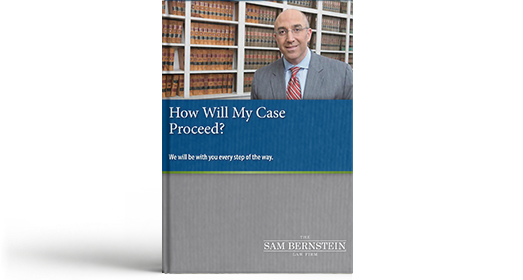ROUNDUP® CANCER LAWSUIT
If you or a loved one have been diagnosed with Non-Hodgkin's Lymphoma after using Roundup® herbicide you may be entitled
to compensation!
Call 1-800-CALL-SAM for a free consultation!
ROUNDUP® CANCER LAWSUITS
More than 13,000 lawsuits have been filed against the manufacturer of the popular herbicide Roundup®. Plaintiffs claim the product caused them to develop non-Hodgkin's lymphoma. The lawsuits also allege the company failed to warn consumers about the risks and manipulated research records. So far, two plaintiffs have been awarded settlements of approximately $80 million each. The lawsuits were filed against Bayer AG, the German company that recently acquired Roundup®’s original developer and manufacturer, Monsanto.
If you or a family member was exposed to Roundup® and has since developed cancer, especially non-Hodgkin's lymphoma, you may be eligible to receive compensation. Because timing in these cases is critical, contact us immediately to learn how we can help you and your family.
Get The Bernstein Advantage® today.
WHAT IS ROUNDUP®?
Monsanto developed and began marketing the weed killer Roundup® in the mid-1970s. It was the first product of its kind to include glyphosate, a broad-spectrum herbicide that obstructs the aromatic production chain path of plants. Because vegetation, including weeds, cannot survive if this process is blocked, Roundup® is highly effective. In addition to glyphosate, Roundup® also contains allegedly "inactive" ingredients such as surfactants and adjuvants.
In addition, Monsanto developed a line of genetically modified seeds that produce glyphosate-resistant plants, called Roundup Ready® crops.
Submit the simple form to the right for a free consultation now.
MORE INFORMATION ON ROUNDUP®:
HOW IS ROUNDUP® LINKED TO CANCER?
Certain kinds of cancer, particularly non-Hodgkin's lymphoma and its subtypes, have been linked to Roundup’s primary active ingredient, glyphosate. In 2015, this chemical was classified as a Group 2A herbicide and deemed "probably carcinogenic to humans" by the International Agency for Research on Cancer (IARC), an autonomous research agency of the World Health Organization (WHO). The organization based its findings on studies of glyphosate exposure in several countries around the world.
Additionally, a new study by researchers at the University of Washington’s Department of Environmental & Occupational Health Sciences found exposure to glyphosate may increase the risk of non-Hodgkin's lymphoma by as much as 41%. The results were based on a comprehensive analysis of epidemiologic studies published between 2001 and 2018. The data included research on humans and laboratory animals.
WHAT IS NON-HODGKIN'S LYMPHOMA?
Non-Hodgkin's lymphoma is a type of cancer also known as non-Hodgkin lymphoma, NHL or lymphoma. It affects the white blood cells, or lymphocytes, which are part of the body’s immune system.
NHL usually starts in the lymph nodes or other lymph tissue, although it sometimes involves the skin. Lymphomas can start in any location where lymph tissue is found. Major sites include lymph nodes, spleen, bone marrow, thymus, tonsils and adenoids and the digestive tract, including the stomach and intestines.
Non-Hodgkin's lymphoma can affect B-cells or T-cells, although B-cell lymphomas are more common.
Here is a list of the major categories and subtypes of non-Hodgkin's lymphoma:
- B-cell lymphomas (about 85% of all NHL in the U.S.)
- Diffuse large B-cell lymphoma (DLBCL) (about 33% of all NHL in the U.S.)
- Primary mediastinal B-cell lymphoma
- Follicular lymphoma (about 20% of all lymphomas in the U.S.)
- Chronic lymphocytic leukemia (CLL)/small lymphocytic lymphoma (SLL)
- Burkitt lymphoma
- Hairy cell leukemia (HCL)
- Lymphoplasmacytic lymphoma (Waldenstrommacroglobulinemia)
- Mantle cell lymphoma (about 5% of lymphomas)
- Marginal zone B-cell lymphomas (about 5–10% of all lymphomas)
- Extranodal marginal zone B-cell lymphoma, also known as mucosa-associated lymphoid tissue (MALT) lymphoma
- Nodal marginal zone B-cell lymphoma
- Splenic marginal zone B-cell lymphoma
- Primary intraocular lymphoma (lymphoma of the eye)
- Primary central nervous system (CNS) lymphoma
- Diffuse large B-cell lymphoma (DLBCL) (about 33% of all NHL in the U.S.)
- T-cell lymphomas (about 15% of NHLs in the U.S.)
- Peripheral T-cell lymphomas (PTCL)
WHO IS AT RISK?
The Roundup® product line includes a variety of formulas for residential and commercial use. Originally, Roundup® was used mainly on corn, soy and cotton crops that were genetically modified to withstand the chemical. However, in the past several years, the use of the product has extended to a wide variety of crops. These include almonds, peaches, cantaloupe, onions, cherries, sweet corn and citrus fruits. Other uses include golf courses, commercial plant nurseries, forests and public parks.
Here is a partial list of those who may be at risk from exposure to Roundup®:
- Farmers and other agricultural workers
- Golf course employees or frequent golfers
- Commercial plant nursery employees
- Forestry workers
- State and county road maintenance crews
- Parks and recreation employees
- Landscapers
- Homeowners
Contact our team of experienced personal injury attorneys to find out if you are eligible to receive compensation and to answer any questions you may have. The consultation is free!
DATE AND DURATION OF EXPOSURE
The date of exposure could range from the mid-1970s, when Roundup® first became available, to recent years or months. The time it takes a person to become ill after being exposed to Roundup® is not known with specificity. In addition, the amount of exposure necessary to cause cancer has not been fully determined. Some of the research indicates a person could develop cancer after being exposed for just eight hours, even if the exposure is not continuous and occurs over multiple years.
It is important to contact us as soon as possible if you or a loved one developed cancer after exposure to Roundup®.
Lawsuits
The above-mentioned lawsuits claimed Monsanto deliberately failed to warn consumers of the cancer risks associated with Roundup®. The plaintiffs’ attorneys also presented evidence supporting claims that Monsanto influenced the outside studies of Roundup’s active ingredient, glyphosate, thereby tainting the safety research. Evidence included emails from outside researchers asking Monsanto’s scientists to review drafts of their findings. Other court documents showed replies from Monsanto employees recommending changes to the reports.
HOW LONG DO I HAVE TO FILE A CLAIM?
If you or a loved one were harmed by exposure to the pesticide Roundup®, contact us immediately.
These types of claims typically involve a statute of limitations, which is the time you have to file a lawsuit against the party responsible for your illness or injury. Because it may be difficult to determine when your exposure and subsequent illness began, it is important to contact us as soon as possible.
IS GLYPHOSATE FOUND IN OTHER PRODUCTS?
After Monsanto’s patent for glyphosate expired in 2000, other companies began manufacturing and selling their own glyphosate-based products. As a result, exposure to the chemical increased exponentially throughout the world. Glyphosate is now the world’s most widely used weed killing chemical.
CONTACT OUR EXPERIENCED ROUNDUP® LAWSUIT ATTORNEYS TODAY!
We are Michigan's most experienced personal injury law firm with over 800 years of combined legal experience. Our team of attorneys are standing by ready to fight for the compensation you deserve. Don’t let the legal clock run out!
To start your case today, click here or call 1-800-CALL-SAM for a free, no-obligation remote consultation from the safety and comfort of your home. We treat all of our clients like family and with our No Fee Guarantee® you'll never pay a single fee until we win your case. That's The Bernstein Advantage®!
Disclaimer: Roundup® is a registered trademark of its owner. The owner of this brand does not sponsor and is not affiliated with The Sam Bernstein Law Firm, PLLC.
SOURCES:
- https://www.npr.org/2019/03/27/707439575/jury-awards-80-million-in-damages-in-roundup-weed-killer-cancer-trial
- https://www.wsj.com/articles/roundup-the-weedkiller-that-changed-farming-faces-a-reckoning-11554735900?mod=searchresults&page=1&pos=2
- https://www.cancer.org/content/cancer/en/cancer/non-hodgkin-lymphoma/about/what-is-non-hodgkin-lymphoma.html
- http://www.washington.edu/news/2019/02/13/uw-study-exposure-to-chemical-in-roundup-increases-risk-for-cancer/
Client reviews

"THEY KEPT ME UPDATED."
- Veronica, Actual Client

"I WILL BE FOREVER GRATEFUL."
- Tim, Actual Client

"I FELT LIKE I WAS A PART OF THE FAMILY"
- Terrence, Actual Client

"VERY PROFESSIONAL & KNOWLEDGEABLE"
- Sherry, Actual Client

"PASSIONATE, COMPETENT, COMMITTED"
- Actual Client

"THEY STAND BY THEIR WORD."
- Actual Client

"KIND & COMPASSIONATE"
- Nancy, Actual Client

"YOU CAN TRUST THEM 100%."
- Michael, Actual Client

"HONEST, CARING, SUPPORTIVE."
- Janice, Actual Client

"THEY TOOK PERSONAL INTEREST IN ME."
- Janice, Actual Client

"I KNEW I WAS IN GOOD HANDS"
- Jerry, Actual Client

"NUMBER ONE PERSON I'D RECOMMEND."
- Actual Client

"SAM'S GOT YOU COVERED."
- Chris, Actual Client



